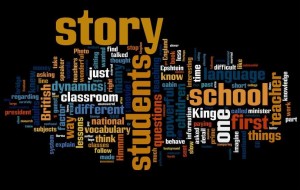I have already read Fiona’s incredible post on multitasking (yes, that’s the “m” word!) three times and still don’t feel I have taken it all in. There’s so much here to think about! For the moment I will start with one point.
Somehow I always thought of multitasking in terms of amusing the baby and getting the dishes done at the same time, or cooking and thinking about Fiona’s blog post (which leads to forgetting the seasoning!).
I hadn’t given much thought to how much (or how little) I’m having my students multitask in class.
Fiona says: “Focusing on form and meaning in language, on the other hand, is something we do at least since birth… Ultimately, for children to have meaning and form separated, or to meet form and meaning independently of any other activity is to underload, not the opposite. Learning language while busy with something else is just part of life…”
Fiona doesn’t seem to be fond of teaching isolated words…
This sounds so true and so natural. It makes sense and worries me regarding my deaf and hard of hearing students.
If you think of these children learning their l1 while interacting with their parents in real life situation, you discover that their vocabulary looks like a slice of cheese full of holes. There is no accidental learning – what was not taught isn’t known. So you find the 10 year old who doesn’t know the word “frying pan” as his mother says “I’ll make you an egg” not “I’ll make you an egg in the frying pan”. Or the 18 year old who had never encountered the word “ashtray”.
I teach these children a foreign language through reading and writing. Form is our access to the language itself, “form” as in the written word.
I can’t bring meaning in a natural/exciting/significant manner to the multitude of unknown words which they encounter at once, in every single text. If I call my lesson “smelling your way to the second conditional” a meaningful way to understanding the word “would” (which is a difficult, abstract one!) the sad fact is that it took an entire lesson! When the students are focusing on understanding an unseen-reading passage they concentrate solely on comprehension, puzzling out the answers expected of them for the questions. They use their dictionaries and very few new words are learned. ***
It is only when we work on vocabulary in an isolated manner, without a context, focusing on the shape of the word in order to remember its meaning, do the students exhibit word retention.
So, you might say, for deaf and hard of hearing children learning words without context is more beneficial, and that’s that.
Unfortunately, it seems to be so only for some of the children. Some seem to really internalize only those words that made a click in their brain somehow. I’m sure my student this morning will remember the word “cheap” because she hit on the idea that it reminds her of the word “chips” (French Fries) and they are cheaper than a hamburger. But that only works for her personally. And if each and every word she learns needs to have this “click” (and she’s in high-school!) before she can remember it, then she will join the ranks of those students who progress VERY slowly.
Therefore, it seems that form and meaning are best taught together, as Fiona says, but that it is a very hard goal to achieve when language is acquired through reading and not listening!
*** There are exception, of course!


